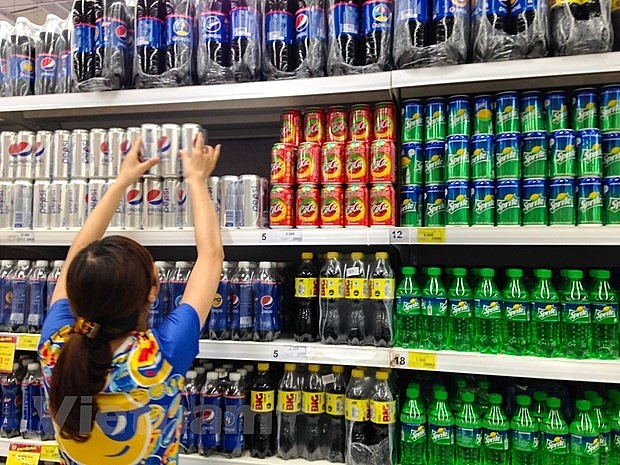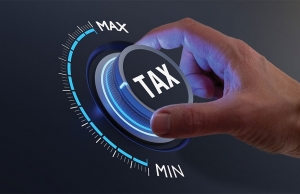Enterprises wary over “rushed” tax on sugary drinks
The Vietnam Chamber of Commerce and Industry convened a seminar last week to discuss the potential creation of the special consumption tax (SCT), marking the latest in a series of actions aimed at implementing fiscal tools to improve public health.
 |
| Enterprises wary over “rushed” tax on sugary drinks, source: VNA |
At the heart of the proposal, spearheaded by the Ministry of Finance (MoF), is the introduction of the SCT on sugary beverages to mitigate the prevalence of non-communicable diseases, most notably obesity.
Delegates at the seminar, however, expressed apprehension over the efficacy of such measures, questioning their potential to successfully curb obesity rates and enhance public health. There were also fears about possible adverse effects on the beverage industry and macroeconomic stability.
They noted that the SCT law from 2008 has already been amended several times, and as recently as last year, to align with practical realities and evolving tax management requirements.
However, as the application of the SCT has unfolded, several aspects have become outdated, particularly those encouraging the shift towards importing, producing, and using environmentally friendly products that safeguard consumer health.
In light of these practical necessities, many representatives recommended revising the current law, focusing on elements with significant impact on businesses within the production and commerce chains.
Nguyen Minh Thao, director of Business Environment and Competitiveness at the Central Institute for Economic Management (CIEM), said that any expansion of the tax required careful thinking. She criticised the MoF for the vagueness of their outlined objectives and the lack of clarity regarding the policy’s ramifications for individuals, businesses, and the national economy.
A similar proposal to implement an SCT on sugary drinks was put forth by the MoF in 2017, but never came to fruition.
“A CIEM survey conducted between 2018 and 2021 revealed that should such a tax be introduced at 10 per cent, coupled with a 2 per cent increase in VAT, the beverage industry could potentially incur losses of around $158 million,” Thao said. “In contrast, the rise in state budget tax revenue would only be roughly $113.45 million.”
In addition to the direct implications for the beverage industry, there is a potential domino effect on the wider value chain, affecting packaging companies, transportation, retail, and even the sugar industry, with consequences for the broader Vietnamese economy, Thao added.
Nguyen Van Viet, chairman of the Vietnam Alcohol-Beverage-Soft Drink Association, pointed to figures from the General Statistics Office highlighting the first half-year economic scenario.
As per these figures, Vietnam’s GDP in the second quarter of 2023 saw a moderate uplift of 4.14 per cent on-year, barely outpacing the meagre growth observed during the same period in 2020. Meanwhile, the consumer price index for the first half of 2023 rose by 3.29 per cent on-year, while core inflation soared to 4.74 per cent on-year.
“In addition, businesses are under significant financial pressures due to recent policy measures such as the enforcement of the recycling responsibility for packaging, which will take effect from 2024,” Viet said.
He cautioned that any ill-considered tax reforms could have significant implications for business recovery and the government’s growth objectives.
Vu Tu Thanh, deputy regional managing director of the US-ASEAN Business Council, offered insights into the global application of the SCT. He highlighted instances where obesity rates rose rather than decreased in the years following the SCT’s implementation of sugar-sweetened beverages.
“Contrary to expectations, the rate of obesity did not decrease over time following the tax imposition but had actually increased. This unexpected trend was observed in countries such as Chile, Belgium, Mexico, Denmark, and Norway. This counterintuitive outcome underscores the complexity of obesity as a public health issue and suggests that taxation alone may not be sufficient to address this challenge,” he said.
Drawing attention to Chile’s experience, Thanh said, “In 2009-2010, the obesity rates for men and women stood at 19.2 and 30.7 per cent respectively. However, after the 2014 introduction of SCT on soft drinks, by 2016-2017, the obesity rates for both sexes had alarmingly risen to 30.3 and 38.4 per cent.”
Emphasising the significance of the SCT law, Thai Quynh Mai Dung, standing member of the National Assembly’s Committee for External Relations, proposed a measured approach to amendments to reflect the country’s growth and current context.
“Any alteration to the law, including potential additions to the SCT remit, must be carefully weighed,” Dung said. “Individual and business interests must be harmonised by incorporating input from businesses and industry associations in policy construction.”
 | Special consumption tax needs supportive roadmap Experts and businesses have said that amid numerous woes and economic crises, the plan to raise the special consumption tax (SCT) is not suitable at this time. |
 | Changes to special consumption tax must be studied carefully The impacts of the imposition or increases of special consumption tax on several products must be studied carefully to ensure State budget revenue and the development of production and business, experts said. |
 | Beverage businesses baulk at tax rise plans Industry experts and beer producers are urging for a delay in any increase to special consumption tax until at least 2026, giving the industry more time to recover from low growth. |
What the stars mean:
★ Poor ★ ★ Promising ★★★ Good ★★★★ Very good ★★★★★ Exceptional
Related Contents
Latest News
More News
- State corporations poised to drive 2026 growth (February 03, 2026 | 13:58)
- Why high-tech talent will define Vietnam’s growth (February 02, 2026 | 10:47)
- FMCG resilience amid varying storms (February 02, 2026 | 10:00)
- Customs reforms strengthen business confidence, support trade growth (February 01, 2026 | 08:20)
- Vietnam and US to launch sixth trade negotiation round (January 30, 2026 | 15:19)
- Digital publishing emerges as key growth driver in Vietnam (January 30, 2026 | 10:59)
- EVN signs key contract for Tri An hydropower expansion (January 30, 2026 | 10:57)
- Vietnam to lead trade growth in ASEAN (January 29, 2026 | 15:08)
- Carlsberg Vietnam delivers Lunar New Year support in central region (January 28, 2026 | 17:19)
- TikTok penalised $35,000 in Vietnam for consumer protection violations (January 28, 2026 | 17:15)

 Tag:
Tag:




















 Mobile Version
Mobile Version